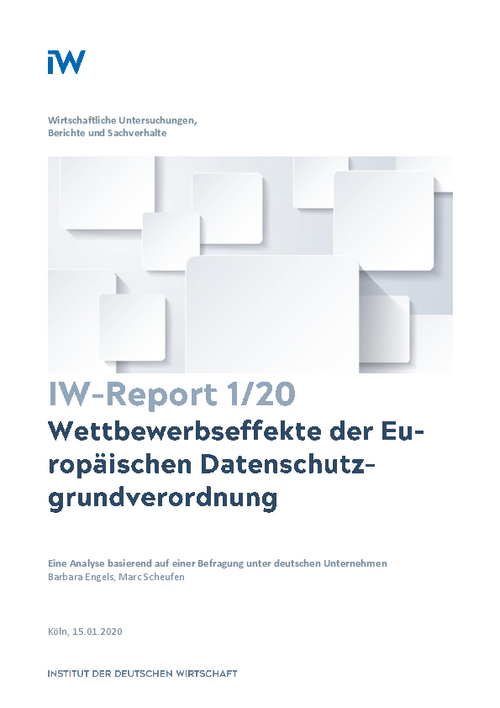The European General Data Regulation (GDPR) increases the level of protection of personal data and standardizes it throughout Europe.

An Analysis Based on a Survey Among German Companies: Competition Effects of the General Data Protection Regulation
IW-Report

The European General Data Regulation (GDPR) increases the level of protection of personal data and standardizes it throughout Europe.
All companies that process personal data must react to this. This has very different direct and indirect effects on companies. They have different starting positions due to different business models, company sizes and organisational structures and can react to the GDPR with different personnel and financial resources. The ability and way companies deal with the GDPR thus has indirect effects on the position of the companies in the competitive environment. But the GDPR can also have direct effects on the competitive position of companies. This is the case if companies that have to comply with the DSGVO compete with companies that do not have to comply with the DSGVO, for example in the case of economic activities outside the European Union. Against this background, this report examines, on the basis of a survey conducted as part of the “IW Zukunftspanel”, the effort German companies have experienced to date in implementing and complying with the GDPR and how they assess the effects of the GDPR on their own competitive position. This is particularly relevant because data is becoming an increasingly valuable resource. For most of the companies surveyed, the GDPR has no advantages for their competitive position. One third even sees disadvantages, in particular since the implementation effort is estimated to be very high. On the other hand, particularly digitalized and innovative companies perceive the GDPR as advantageous for their competitive position. Against this background, political efforts should be made to establish the GDPR as an international data protection standard, while companies should receive greater support in its implementation.

Barbara Engels / Marc Scheufen: Wettbewerbseffekte der Europäischen Datenschutzgrundverordnung – Eine Analyse basierend auf einer Befragung unter deutschen Unternehmen
IW-Report

More on the topic

Data Utilisation and Data Sharing: The Potential and the Reality in German Companies
Companies that store their data extensively in digital form, process it in a structured manner and use it in a variety of ways can become particularly efficient members of the data economy.
IW
Intellectual property and fourth industrial revolution technologies: how the patent system is shaping the future in the data-driven economy
Using the classification system from the European Patent Office (EPO), we identify almost 600,000 patent applications for fourth industrial revolution technologies from 1986 to 2015.
IW